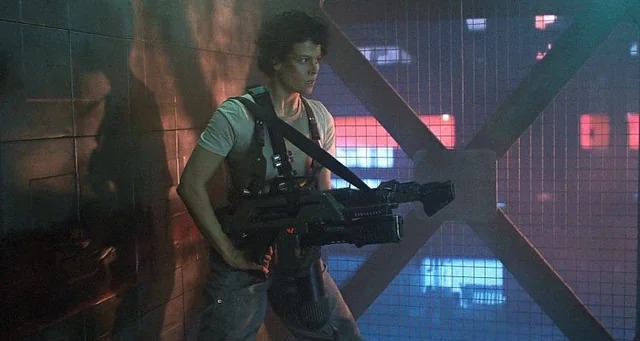Aliens (1986 )

Aliens (1986): A Study in Courage and Survival
James Cameron’s “Aliens” (1986) is not merely a sequel to Ridley Scott’s 1979 classic Alien; it is a masterful expansion of the original’s universe that deepens its narrative and themes. This film is a seminal work in science fiction and action genres, blending horror with thrilling, high-octane adventure while exploring profound themes of courage, motherhood, and human resilience.
Plot Overview:
“Aliens” picks up 57 years after the events of Alien. Ellen Ripley (Sigourney Weaver) has been drifting in space in cryosleep since her last encounter with the xenomorphs. She is rescued and brought back to Earth, only to find that the colony she once worked for, on the planet LV-426, has gone silent. The film follows Ripley as she returns to the planet with a group of Colonial Marines to investigate, only to discover that the colony has been overrun by the deadly alien creatures.

Themes and Significance:
- Courage and Survival: “Aliens” is a story of courage in the face of overwhelming odds. Ripley, the film’s central character, emerges as a symbol of bravery and resilience. Her return to LV-426 is driven by a deep sense of duty and a desire to protect others from the horrors she has faced. The Colonial Marines, though initially portrayed as confident and well-prepared, soon face their own tests of bravery as they confront the xenomorphs. The film’s intense action sequences and claustrophobic settings serve as a backdrop for exploring the characters’ strength and will to survive.
- Motherhood and Feminism: One of the film’s most significant themes is motherhood. Ripley’s relationship with the young girl Newt (Carrie Henn) becomes central to the narrative. Ripley’s protective instincts and her role as a surrogate mother highlight the theme of maternal sacrifice and nurturing. The film contrasts Ripley’s motherly instincts with the alien Queen’s predatory nature, emphasizing different forms of maternal instinct—one nurturing, the other destructive.
- Human Resilience: “Aliens” also examines human resilience against alien threats. The xenomorphs, as a symbol of primal fear and external threats, challenge the characters’ willpower and ingenuity. The film’s pacing and structure underscore the relentless nature of the xenomorphs and the determination of the humans fighting them. Ripley’s struggle and eventual triumph reflect the broader human experience of overcoming seemingly insurmountable challenges.











